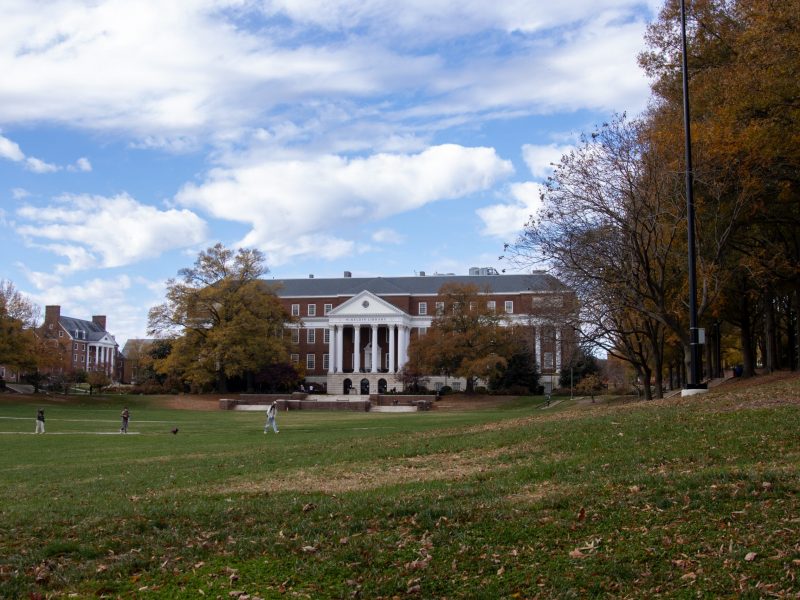Jehnae Linkins recalled being on Zoom meetings with University of Maryland administrators until 9 or 10 p.m., sometimes in her pajamas.
University president Darryll Pines asked five Black students, including Linkins, to identify 25 critical issues for the administration to address after George Floyd’s murder and the ensuing Black Lives Matter protests. Linkins and the other students, who represented campus organizations, stayed up late with administration to release the list in 2021.
But in mid-April, a dashboard of the demands and their progress was taken down from the then-Office of Diversity and Inclusion’s webpage. The office has since been renamed and the dashboard has yet to be republished, despite one official’s statement that it would be put back online, likely under a firewall.
Linkins, who graduated in the spring with her doctorate in mechanical engineering, said seeing her hours of hard work disappear from the website was frustrating. She said she didn’t know the dashboard was removed until The Diamondback reached out to write this story.
“To take them down is kind of like a slap in the face,” she said.
Some Black student leaders are urging the administration to republish the dashboard of critical issues. A few of the original authors encouraged current students to fight to make that happen.
According to a Sept. 17 statement from the belonging and community office, it “will share the list of 25 critical issues on the Belonging & Community website as we continue to make updates.”
As of March, the university had completed or noted a sustained commitment to 21 of the critical issues, according to an archived version of the site. This included establishing a racial incident hotline and increasing the number of Black faculty members.
[UMD alters language of Stamp’s multicultural involvement, community advocacy webpage]
Four demands were still in progress, including reducing excessive funding to University of Maryland Police publicly and creating more spaces on campus for Black students. Instead of the dashboard, the site now contains two paragraphs mentioning the critical issues under the “additional campus resources” tab on the website. To access it, one must log in using their directory ID as of Monday.
For university alum Saba Tshibaka, who also helped create the list, seeing it published in 2021 represented months of hard work. Tshibaka also co-founded Black Terps Matter and said having the demands online served as a resource for people to understand how the university could improve to support Black students.
“For them like, to just take it away, is just deplorable,” Tshibaka said.
The dashboard’s disappearance comes as universities nationwide have altered or rolled back diversity, equity and inclusion programming and initiatives under pressure from U.S. President Donald Trump. When the demands webpage was initially removed in April, Pines told The Diamondback that it was not a result of Trump’s threats on these initiatives.
In a separate interview on Wednesday, Pines said the university’s mission and values haven’t and won’t change. He said the belonging and community office’s leadership makes decisions on the website, staffing and roles.
“I think that website has been up for now, four or five years, and most of those demands have been addressed,” Pines told The Diamondback. “Maybe they felt it was appropriate to retire the website.”
This university’s Multicultural Involvement and Community Advocacy office also recently removed resources and information from its website. Another webpage for Immigrant and Undocumented Student Life was removed from the Stamp Student Union’s website over the summer.
Jason Nichols, a senior lecturer in the African American Studies department, said publishing the demands was critical in improving life on campus for all students. The demands’ publication shows the university continues to stand for diversity, equity and inclusion, he said.
[‘Conceding to the pressures’: UMD students criticize DEI office’s renaming]
“It’s important for people who look at the University of Maryland to recognize that we do have an ethos, we do have a position, we do take a stand for something that we’ve said we’ve stood for, for a very long time,” Nichols said.
Nichols said he trusts Pines that the webpage’s removal was not politically motivated. But if it was, Nichols said, he understands it’s a “high pressure time for a lot of universities.”
Kara Mitchell, vice president of Black Girls Vote, said the university is becoming more compliant with the current political climate, which she said seems to dismiss anything that supports minorities.
“It’s just important to recognize that the Black population is very prominent on campus,” she said. “The campus administration should do a better job of recognizing their Black students.”
Carissa Robinson, the Black Student Union’s speaker of the house, said it is even more important to have the demands online because of recent attacks on diversity, equity and inclusion initiatives.
Republishing the demands would be a nice reminder that this university is still committed to diversity, equity and inclusion, the senior government and politics and dance major said. Robinson would be open to organizing a civil protest or setting meetings with university administration, she added.
Students should fight to ensure the demands are republished, said Nichols and Tshibaka.
“Don’t get tired of the battle,” Linkins added. “Don’t get tired of the fight, because at the end of the line, everything will be worth it.”
Assistant news editor and administration reporter Sam Gauntt interviewed university president Darryll Pines for this story.



